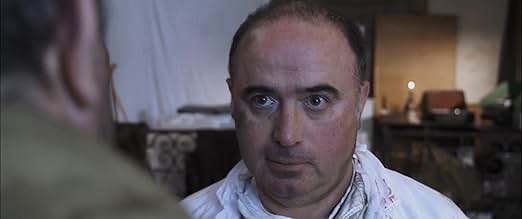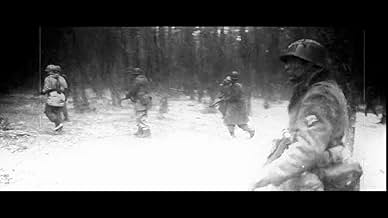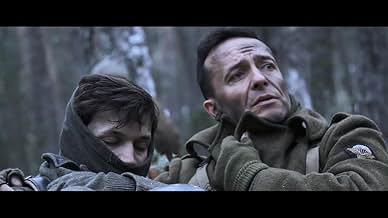Adicionar um enredo no seu idiomaJanuary 1945. The first French regiment of paratroopers to fight with an American unit prepares to liberate Alsace in France during World War II.January 1945. The first French regiment of paratroopers to fight with an American unit prepares to liberate Alsace in France during World War II.January 1945. The first French regiment of paratroopers to fight with an American unit prepares to liberate Alsace in France during World War II.
- Prêmios
- 5 indicações no total
Tommy-Lee Baïk
- Melbarte
- (as Tommy Lee Baïk)
Natale Naccari
- Moretti
- (as Naccari Natale)
James Larabee
- Franois Henaq
- (narração)
Avaliações em destaque
Hi all
I have seen many comments criticizing the English dubbing but having seen the film in French VO I will not allow myself to judge as rajotd.
This film is a loyal historical testimony concerning the brave soldiers (american and french) who fought in the pocket of Colmar and the links between them.
Very well shot and with complete historical realism we note however the small budget allocated to the effects, more real than special ;-)
However, where the film draws all its excellence, it is in the singular story that it tells and in the links between close characters that it brilliantly highlights.
Throughout each scene, the director's passion is felt and during the course of the film we understand how the script has been worked to achieve this result.
Therefore it is a touching, realistic and ultimately both simple and complex film for the story it tells!
I have seen many comments criticizing the English dubbing but having seen the film in French VO I will not allow myself to judge as rajotd.
This film is a loyal historical testimony concerning the brave soldiers (american and french) who fought in the pocket of Colmar and the links between them.
Very well shot and with complete historical realism we note however the small budget allocated to the effects, more real than special ;-)
However, where the film draws all its excellence, it is in the singular story that it tells and in the links between close characters that it brilliantly highlights.
Throughout each scene, the director's passion is felt and during the course of the film we understand how the script has been worked to achieve this result.
Therefore it is a touching, realistic and ultimately both simple and complex film for the story it tells!
Seven months after D-Day, French and American soldiers team-up in the woods outside Jebsheim to liberate northeast France from the German invasion (Jebsheim is located 5-6 miles west of the German border).
"The Frozen Front" (2017), originally titled "Winter War," is a French Indie that pays tribute to the Franco-American allies who secured the forests bordering Jebsheim in preparation for The Battle of Jebsheim that was fought from January 24 to February 2, 1945. The low-budget filmmaking is akin to "Straight into Darkness" (2004), but more straightforward and less surrealistic, although this one isn't as good. It's akin to a more dramatic "When Trumpets Fade" (1998) dubbed in English (from the original French), but made on a much lower budget and less compelling story-wise.
Armchair critics lambaste the movie mainly because of the English dubbing that doesn't match the lips with some lines not dubbed at all wherein you'll see lips move, but no sound. If you can ignore this issue, "The Frozen Front" is effective in showing what it was like for the tough soldiers who took the forests outside the village in January, 1945. The acting is surprisingly convincing despite what critics claim and the English speaking fits the characters despite the dubbing not matching the lips.
The challenges and horrors of war in a winter wilderness setting are chronicled: The cold, the sparse sustenance, living in foxholes, sudden violence, horrific wounds, buddies dying, ramshackle medical care, despair, perseverance, chaplains, brother vs. brother and hope for victory.
The writer/director confidently takes his time in telling his commemorative tale, which I can't help respect. This is a movie solely about men fighting in the wintery woods during WW2, which might be too one-dimensional for many viewers, not to mention overlong by about an hour. Then there's the problematic dubbing.
The film runs 2 hours, 22 minutes, and was presumably shot in France (it was definitely shot in mainland Europe, but I can't find specific data).
GRADE: C
"The Frozen Front" (2017), originally titled "Winter War," is a French Indie that pays tribute to the Franco-American allies who secured the forests bordering Jebsheim in preparation for The Battle of Jebsheim that was fought from January 24 to February 2, 1945. The low-budget filmmaking is akin to "Straight into Darkness" (2004), but more straightforward and less surrealistic, although this one isn't as good. It's akin to a more dramatic "When Trumpets Fade" (1998) dubbed in English (from the original French), but made on a much lower budget and less compelling story-wise.
Armchair critics lambaste the movie mainly because of the English dubbing that doesn't match the lips with some lines not dubbed at all wherein you'll see lips move, but no sound. If you can ignore this issue, "The Frozen Front" is effective in showing what it was like for the tough soldiers who took the forests outside the village in January, 1945. The acting is surprisingly convincing despite what critics claim and the English speaking fits the characters despite the dubbing not matching the lips.
The challenges and horrors of war in a winter wilderness setting are chronicled: The cold, the sparse sustenance, living in foxholes, sudden violence, horrific wounds, buddies dying, ramshackle medical care, despair, perseverance, chaplains, brother vs. brother and hope for victory.
The writer/director confidently takes his time in telling his commemorative tale, which I can't help respect. This is a movie solely about men fighting in the wintery woods during WW2, which might be too one-dimensional for many viewers, not to mention overlong by about an hour. Then there's the problematic dubbing.
The film runs 2 hours, 22 minutes, and was presumably shot in France (it was definitely shot in mainland Europe, but I can't find specific data).
GRADE: C
Poorly acting bad dialogue incredibly bad battle scenes simply an abysmal movie
Ivan has nothing on this, historically accurate I paid 5 dollars to rent it on iTunes and enjoyed it
The title of this movie in ROKU was Winter War. The title I needed to use to find it in IMDB was The Frozen Front. The title used in this review's window is Winter War. Then when it was published, The Frozen Front. Go figure.
I immediately recognized the format of this movie. It was French. French cinematography relies heavily on this monolog philosophical rant about the topic at hand. Each character will have their time in expressing their position on the topic, and usually its noir. It isn't something I like personally, but the French (France) love it. The Italians to a lesser degree.
And there are times when the plot justifies it for my enjoyment. There aren't too many American films that do this. However, one that come close to mind is Taxi Driver. To a much lesser degree, Mike Hammer detective stories.
What rubbed me the wrong way was the script's attempt to paint the harsh and deadly reality of war this French unit had to endure. It gave the impression that they were the only ones, and this was the ultimate hell on earth. To an individual in any theatre of war, it is true, however, the script spent way too much time on it, and it was too simplistic riddled with American cliches. Those of us who have knowledge of harsher conditions, we may begin to feel annoyed as the dialog carries on. One military unit that dealt successfully with hardships and death and were quite successful in WWII was the First Special Service Force. A combination of American and Canadian commandos.
Which leads me to think that maybe it was the translation form French to English. Often, a cliche in one language has no direct corresponding cliché in the other. I notice this quite often in Italian cinematography. When dealing with light humour, this isn't a big deal. When dealing with a serous plot/dialog, this may become torture. A cliche will summarize the emotions and ideas in few words for that language and culture. That is its strength and popularity. Another similar cliche in another language will not convey the same qualities, hence, the script dialog is broken, and the thought process limps and struggles resulting in very negative reviews from Anglophones and positive reviews for Francophones.
As an Anglophone and Italophone, I'm torn between a low rating or higher. I decided to give it three because it was presented in English and the more care should have been given in the English dubbing. But given that the script relied enormously on the style mentioned above, I can't see how it could have been done.
In closing.... it's a war movie focussed on the hardships a small group of men had to endure, both psychologically and physically, in the last days of WWII.
I immediately recognized the format of this movie. It was French. French cinematography relies heavily on this monolog philosophical rant about the topic at hand. Each character will have their time in expressing their position on the topic, and usually its noir. It isn't something I like personally, but the French (France) love it. The Italians to a lesser degree.
And there are times when the plot justifies it for my enjoyment. There aren't too many American films that do this. However, one that come close to mind is Taxi Driver. To a much lesser degree, Mike Hammer detective stories.
What rubbed me the wrong way was the script's attempt to paint the harsh and deadly reality of war this French unit had to endure. It gave the impression that they were the only ones, and this was the ultimate hell on earth. To an individual in any theatre of war, it is true, however, the script spent way too much time on it, and it was too simplistic riddled with American cliches. Those of us who have knowledge of harsher conditions, we may begin to feel annoyed as the dialog carries on. One military unit that dealt successfully with hardships and death and were quite successful in WWII was the First Special Service Force. A combination of American and Canadian commandos.
Which leads me to think that maybe it was the translation form French to English. Often, a cliche in one language has no direct corresponding cliché in the other. I notice this quite often in Italian cinematography. When dealing with light humour, this isn't a big deal. When dealing with a serous plot/dialog, this may become torture. A cliche will summarize the emotions and ideas in few words for that language and culture. That is its strength and popularity. Another similar cliche in another language will not convey the same qualities, hence, the script dialog is broken, and the thought process limps and struggles resulting in very negative reviews from Anglophones and positive reviews for Francophones.
As an Anglophone and Italophone, I'm torn between a low rating or higher. I decided to give it three because it was presented in English and the more care should have been given in the English dubbing. But given that the script relied enormously on the style mentioned above, I can't see how it could have been done.
In closing.... it's a war movie focussed on the hardships a small group of men had to endure, both psychologically and physically, in the last days of WWII.
Principais escolhas
Faça login para avaliar e ver a lista de recomendações personalizadas
- How long is The Frozen Front?Fornecido pela Alexa
Detalhes
- Data de lançamento
- País de origem
- Idioma
- Também conhecido como
- The Frozen Front
- Consulte mais créditos da empresa na IMDbPro
- Tempo de duração2 horas 20 minutos
- Cor
- Proporção
- 2.35 : 1
Contribua para esta página
Sugerir uma alteração ou adicionar conteúdo ausente

Principal brecha
By what name was Winter War (2017) officially released in Canada in English?
Responda
























